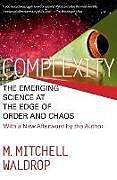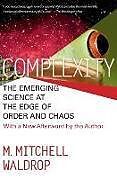Complexity
Einband:
Kartonierter Einband
EAN:
9780671872342
Untertitel:
The Emerging Science at the Edge of Order and Chaos
Genre:
Mathematik
Autor:
Mitchell M. Waldrop
Herausgeber:
Simon & Schuster N.Y.
Anzahl Seiten:
384
Erscheinungsdatum:
01.01.1993
ISBN:
978-0-671-87234-2
A look at the rebellious thinkers who are challenging old ideas with their insights into the ways countless elements of complex systems interact to produce spontaneous order out of confusion
Douglas R. Hofstadter author of Götel, Esther, Bach One comes away from Complexity both intellectually excited by ideas and emotionally involved with the people struggling to formulate them. This is a deep tale of science in the making.
Autorentext
M. Mitchell Waldrop has his doctorate in elementary particle physics and is the author of Man-Made Minds. He spent ten years as a senior writer for Science magazine, where he is now a contributing correspondent.
Klappentext
Science magazine reporter Waldrop introduces researchers--rebellious graduate students, Nobel laureates, and pragmatic businessmen--who are formulating surprising answers to complex questions about the universe. Line drawings.
Zusammenfassung
Why did the stock market crash more than 500 points on a single Monday in 1987? Why do ancient species often remain stable in the fossil record for millions of years and then suddenly disappear? In a world where nice guys often finish last, why do humans value trust and cooperation? At first glance these questions don't appear to have anything in common, but in fact every one of these statements refers to a complex system. The science of complexity studies how single elements, such as a species or a stock, spontaneously organize into complicated structures like ecosystems and economies; stars become galaxies, and snowflakes avalanches almost as if these systems were obeying a hidden yearning for order.
Drawing from diverse fields, scientific luminaries such as Nobel Laureates Murray Gell-Mann and Kenneth Arrow are studying complexity at a think tank called The Santa Fe Institute. The revolutionary new discoveries researchers have made there could change the face of every science from biology to cosmology to economics. M. Mitchell Waldrop's groundbreaking bestseller takes readers into the hearts and minds of these scientists to tell the story behind this scientific revolution as it unfolds.
Leseprobe
Chapter 1
The Irish Idea of a Hero
Sitting alone at his table by the bar, Brian Arthur stared out the front window of the tavern and did his best to ignore the young urban professionals drifting in to get an early start on Happy Hour. Outside, in the concrete canyons of the financial district, the typical San Francisco fog was turning into a typical San Francisco drizzle. That was fine by him. On this late afternoon of March 17, 1987, he wasn´t in the mood to be impressed with brass fittings, ferns, and stained glass. He wasn´t in a mood to celebrate Saint Patrick´s Day. And he most definitely wasn´t in a mood to carouse with ersatz Irishmen wearing bits of green on their pinstripes. He just wanted to silently sip his beer in frustrated rage. Stanford University Professor William Brian Arthur, native son of Belfast, Northern Ireland, was at rock bottom.
And the day had started so well.
That was the irony of it all. When he´d set out for Berkeley that morning, he´d actually been looking forward to the trip as a kind of triumphal reunion: local boy makes good. He´d really loved his years in Berkeley, back in the early 1970s. Perched on the hillsides north of Oakland, just across the bay from San Francisco, it was a pushy, vital, alive kind of place full of ethnics and street people and outrageous ideas. Berkeley was where he´d gotten his Ph. D. from the University of California, where he´d met and married a tall blonde doctoral student in statistics named Susan Peterson, where he´d spent his first "postdoc" year in the economics department. Berkeley, of all the places he´d lived and worked ever since, was the place he wanted to come home to.
Well now he was coming home, sort of. The event itself wouldn´t be a big deal: just lunch with the chairman of the Berkeley economics department and one of his former professors there. But it was the first time he´d come back to his old department in years, and certainly the first time he´d ever done so feeling like an academic equal. He was coming back with twelve years of experience working all over the globe and a major reputation as a scholar of human fertility in the Third World. He was coming back as the occupant of an endowed chair of economics at Stanford -- the sort of thing that rarely gets handed out to anyone under age fifty. At age forty-one, Arthur was coming back as someone who had made it in academia. And who knew? The folks at Berkeley might even start talking about a lob offer.
Oh yes, he´d really been high on himself that morning. So why hadn´t he, years ago, just stuck to the mainstream instead of trying to invent a whole new approach to economics? Why hadn´t he played it safe instead of trying to get in step with some nebulous, half-imaginary scientific revolution?
Because he couldn´t get it out of his head, that´s why. Because he could see it almost everywhere he looked. The scientists barely seemed to recognize it themselves, most of the time. But after three hundred years of dissecting everything into molecules and atoms and nuclei and quarks, they finally seemed to be turning that process inside out. Instead of looking for the simplest pieces possible, they were starting to look at how those pieces go together into complex wholes.
He could see it happening in biology, where people had spent the past twenty years laying bare the molecular mechanisms of DNA, and proteins, and all the other components of the cell. Now they were also beginning to grapple with the essential mystery: how can several quadrillion such molecules organize themselves into an entity that moves, that responds, that reproduces, that is alive?
He could see it happening in the brain sciences, where neuroscientists, psychologists, computer scientists, and artificial intelligence researchers were struggling to comprehend the essence of mind: How do those billions of densely interconnected nerve cells inside our skulls give rise to feeling, thought, purpose, and awareness?
He could even see it happening in physics, where the physicists were still trying to come to terms with the mathematical theory of chaos, the intricate beauty of fractals, and the weird inner workings of solids and liquids. There was profound mystery here: Why is it that simple particles obeying simple rules will sometimes engage in the most astonishing, unpredictable behavior? And why is it that simple particles will spontaneously organize themselves into complex structures like stars, galaxies, snowflakes, and hurricanes -- almost as if they were obeying a hidden yearning for organization and order?
The signs were everywhere. Arthur couldn´t quite put the feeling into words. Nobody could, so far as he could tell. But somehow, he could sense that all these questions were really the same question. Somehow, the old categories of science were beginning to dissolve. Somehow, a new, unified science was out there waiting to be born. It would be a rigorous science, Arthur was convinced, just as "hard" as physics ever was, and just as thoroughly grounded in natural law. But instead of being a quest for the ultimate particles, it would be about flux, change, and the forming and dissolving of patterns. Instead of ignoring everything that wasn´t uniform and predictable, it would have a place for individuality and the accidents of history. Instead of being about simplicity, it would be about -- well, complexity.
And that was precisely where Arthur´s new economics came in. Conventional economics, the kind he´d been taught in school, was about as far from this vision of complexity as you could imagine. Theoretica…

Leider konnten wir für diesen Artikel keine Preise ermitteln ...
billigbuch.ch sucht jetzt für Sie die besten Angebote ...
Die aktuellen Verkaufspreise von 6 Onlineshops werden in Realtime abgefragt.
Sie können das gewünschte Produkt anschliessend direkt beim Anbieter Ihrer Wahl bestellen.
Loading...
Die aktuellen Verkaufspreise von 6 Onlineshops werden in Realtime abgefragt.
Sie können das gewünschte Produkt anschliessend direkt beim Anbieter Ihrer Wahl bestellen.
| # | Onlineshop | Preis CHF | Versand CHF | Total CHF | ||
|---|---|---|---|---|---|---|
| 1 | Seller | 0.00 | 0.00 | 0.00 |
